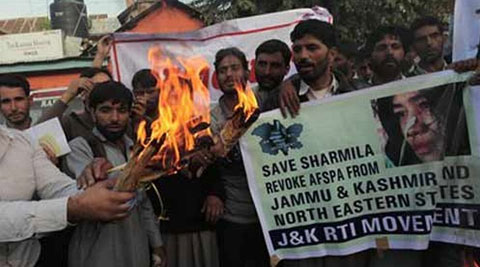By Bunker Roy

The Centre has not only shown a lack of will and courage to dispense with this act, but even blocked a debate on it.
Why it may be time to revoke the AFSPA in areas like Manipur.
Gandhi (1982), an epic but intimate biographical film, was Richard Attenborough's greatest triumph.
The release of Irom Sharmila from custody and her subsequent arrest have again raised the issue of whether the Armed Forces (Special Powers) Act should remain in force in areas like Manipur. For some time, the chief minister of J&K has asserted that his state can do without the AFSPA. In Manipur, Sharmila has been on hunger strike for 14 years, demanding that this controversial and draconian law be repealed.
Neither the UPA nor the present government has paid any heed. What is so special about this law and why are all governments so reluctant to do away with it? It provides the authorities with a shortcut to assume certain repressive powers that are not normally available to them in a democratic society. It gives commissioned as well as non-commissioned officers of the armed forces special powers to deal with law and order situations in areas notified by the Central or state government as “disturbed”. These special powers include the right to use force, even to cause death; arrest without a warrant; destroy shelters, camps, structures, arms dumps; enter and search without a warrant. But neither the AFSPA nor any other law defines what constitutes a “disturbed” area.
The AFSPA, originally intended as a short-term measure, has remained in force for decades in states like Manipur. Despite tremendous public agitation in that state, the Centre has declined to repeal it, even though there is considerable evidence that it has led to gross violations of human rights. A number of committees, like the Jeevan Reddy Committee and the Santosh Hegde Committee, have clearly indicted the armed forces for gross violations of human rights and recommended the repeal of this exceedingly harsh law.
An argument often put forward by the government and army in support of the law is that the Supreme Court upheld its constitutional validity in the 1998 case, Naga People’s Movement of Human Rights vs Union of India. A law may be constitutionally valid, but that is no guarantee against misuse. The Pathribal fake encounter case of March 2000 and the alleged rape and murder of Thangjam Manorama Devi, a 34-year-old Manipuri woman, in 2004 by armed forces personnel are only two of the many examples of such misuse.
The army also asserts that the majority of complaints of human rights violations against its personnel are false. The problem with this type of argument is that most complaints are investigated and tried by the army itself. It has shown considerable reluctance to hand over such cases to the civil authorities or courts. It is only at the intervention of higher courts that the army has been forced to hand over some cases to outside investigating agencies like the CBI.
The AFSPA provides protection to armed forces personnel working under it, as no prosecution can be launched against them without sanction from the Centre. Civil rights activists have often complained that this gives them impunity. This argument is not very convincing because even if this provision is removed from the act, members of the armed forces will continue to be covered by Section 197 of the CrPC, which debars courts from taking cognisance of any offence alleged to have been committed by them without sanction from the Centre.
The Centre has not only shown a lack of will and courage to dispense with this act, but even blocked a debate on it by suppressing Justice Reddy’s report. Last year, the then Union finance minister, P. Chidambaram, even expressed the helplessness of his government to revoke the law because the army was against it. This is a country where the army is supposed to work under civilian control and decisions like imposing or revoking a particular law have to be taken by the government, not by the army. Chidambaram should have found a different argument to explain the Centre’s reluctance.
The army has been deployed to deal with serious law and order situations in this country on numerous occasions. In most instances, it has dealt with the problem without the protection of the AFSPA. It is therefore time the government showed willingness to objectively assess the need to retain this law. It may consider keeping it in operation in states affected by insurgency or terrorism, particularly when the trouble emanates from across the border. However, it may revoke the law in areas that are comparatively peaceful. If the government can think of controlling Maoist violence in some areas of the country without invoking the AFSPA, why can’t it do the same in areas like Manipur?
The writer is a retired director of the Bureau of Police Research and Development and author of ‘Policing in India — Some Unpleasant Essays’






